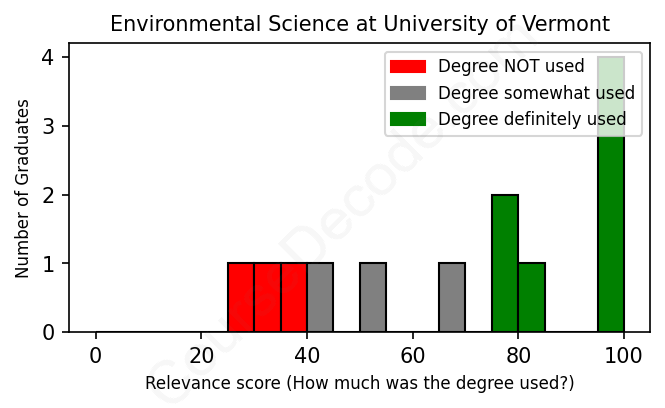
First, some facts. Of the Environmental Science graduates from University of Vermont we've analyzed , here's how many have used (or NOT used) their degree in their career:

These are estimates based on AI analysis of 13 LinkedIn profiles (see below).
The verdict? Slightly above average. Overall, with an average relevance score of 68%, Environmental Science graduates from University of Vermont have a slightly higher likelihood (+1%) of finding work in this field compared to the average graduate across all fields:
And for comparison, here's the chart for all profiles we've looked at across all degrees.
Also, after graduating, only 15% of these graduates have pursued further education other than another Bachelor's degree (such as a Masters degree or other), compared to the average across all profiles of 35%. This suggests a Bachelors degree is enough for most Environmental Science graduates, and it's normal to look for work straight after graduation.
See the details:
|
Relevance score: 100% We think this person has gone into a career highly relevant to their degree. We think this person has gone into a career highly relevant to their degree.
DEGREE INFOGraduated in 2018 from University of Vermont with a Bachelor of Science - BS in Environmental Science. No other secondary education since. JOB HISTORY SINCE GRADUATIONPeace Corps Education Volunteer Peace Corps Jul 2018 - Mar 2020 Field Technician/Stormwater Manager  Specified Testing Labs LLC Dec 2020 - Mar 2022 Botany Technician  The Great Basin Institute May 2022 - Nov 2022 Biological Science Technician  Bureau of Land Management Apr 2023 - Dec 2023 ABOUTI am in the environmental science and conservation fields with experience doing rare plant surveys, invasive plant management, habitat assessments, and groundwater monitoring. I have three years of experience performing rigorous field work and data collection. I am a returned Peace Corps educator who served in Guinea, West Africa teaching biology and physics for two years. I have a B.S. in environmental science and have a passion for plant biology, marine conservation, and educating young people on the natural world. |
The top 10 most common jobs done by the graduates we've analyzed (ranked most common to least) are:
When looking at the job paths of Environmental Science graduates from the University of Vermont, there seems to be a mix of roles that relate well to their studies and others that stray quite a bit from the field. Many graduates find themselves in positions like Environmental Scientist or Project Manager, which are closely tied to their education. For example, roles in environmental consulting, energy management, and sustainability practices directly utilize the principles they learned during their degree. However, there’s also a noticeable trend of graduates drifting into roles like content writing, marketing, and even food service, where their Environmental Science expertise isn't applied at all.
Overall, while some alumni have successfully landed jobs that leverage their environmental knowledge, a significant portion of them have taken on roles that are largely unrelated to their degree. In fact, it's common to see positions that focus on project management or communication without any direct engagement with environmental concepts. This suggests that, while the degree provides a solid foundation and opens doors in certain sectors, many graduates might end up in roles where environmental knowledge isn't essential, which is a bit of a mixed bag when it comes to career relevance. It's a reminder that the job market can lead graduates in unexpected directions, sometimes far from their original field of study.
Here is a visual representation of the most common words in job titles for Environmental Science graduates (this is across all Environmental Science graduates we've analyzed, not just those who went to University of Vermont):

Looking at the career paths of graduates from the University of Vermont who earned a degree in Environmental Science, it's clear that many of them start off in jobs that are somewhat aligned with their field, especially in the early years after graduation. For instance, several graduates held positions like Environmental Scientist, Project Manager, or various roles in sustainability. However, over time, it appears that some individuals shift away from directly environmental-focused roles and end up in a variety of other fields, including marketing, education, and even customer service. This suggests that while many graduates find initial opportunities that are relevant to their degree, the long-term connections to Environmental Science can be less consistent.
After around five to ten years, many alumni seem to be taking on roles that might not utilize their Environmental Science background as directly as one might hope. For example, some have transitioned into fields like marketing or education, which, while potentially rewarding, don't always leverage the specifics of their environmental training. Others have remained related to the environmental sector, particularly in government roles or NGOs, but there's a tangible mix in career trajectories. So, while it seems like a solid foundation for a career relevant to Environmental Science is there, the degrees also allow for some flexibility that leads to diverse career paths, not all of which are strictly within the environmental field. It's a mixed bag, definitely showing that a degree in this area can open a lot of doors, even if they don't always lead back to the great outdoors!
Honestly, a Bachelor's degree in Environmental Science can be a bit challenging, but it's definitely manageable if you're motivated and passionate about the subject. At the University of Vermont, you'll be diving into a mix of science, policy, and hands-on experiences, which can be demanding but also pretty rewarding. You’ll encounter topics like ecology, geology, and climate science, which require a solid grasp of biology and chemistry. Some folks might find the workload heavier than in other majors due to lab work and field studies, but if you stay organized and engaged, it becomes a lot easier to handle. Overall, it’s not necessarily harder than the average degree, but it demands a fair bit of effort and enthusiasm to really shine.
Most commonly, in the LinkedIn profiles we've looked at, it takes people 4 years to finish a Bachelor degree in Environmental Science.
Looking at the job paths of these Environmental Science grads from the University of Vermont, it seems like they’ve had a mix of decent and not-so-decent money-making gigs. The earlier graduates, particularly those who’ve transitioned into project management and roles at established companies like Adobe and even the U.S. Geological Survey, likely pulled in some respectable salaries—especially in fields like tech and environmental consulting, where pay can be quite decent. However, others, especially those transitioning through service or coaching roles, might not have seen as much cash flow, especially early in their careers. Overall, they seem to have landed in a range of pay scales, with some definitely making a good living while others might be scraping by a bit more. It’s typical for this field to have ups and downs in earnings based on experience and specific roles taken on.
Here is a visual representation of the most common words seen in the "about" section of LinkedIn profiles who have a Bachelor degree in Environmental Science (this is across all Environmental Science graduates we've analyzed, not just those who went to University of Vermont). This may or may not be useful:

Here are all colleges offering a Bachelor degree in Environmental Science (ordered by the average relevance score of their Environmental Science graduates, best to worst) where we have analyzed at least 10 of their graduates:
| College | Score | Count |
|---|---|---|
 University of North Carolina at Chapel Hill University of North Carolina at Chapel Hill
|
87 | 10 |
 The Ohio State University The Ohio State University
|
85 | 12 |
 University of Vermont University of Vermont
|
68 | 13 |
 University of Oregon University of Oregon
|
66 | 10 |
 Western Washington University Western Washington University
|
63 | 14 |
 University of Virginia University of Virginia
|
57 | 15 |
 Oregon State University Oregon State University
|
56 | 11 |
 Loyola University Chicago Loyola University Chicago
|
56 | 11 |
 Southern New Hampshire University Southern New Hampshire University
|
53 | 15 |
 University of Phoenix University of Phoenix
|
46 | 15 |
 Florida State University Florida State University
|
45 | 16 |